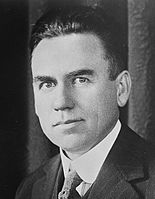- Vernon Dalhart
-
Vernon Dalhart 
Background information Born April 6, 1883 Origin Jefferson, Texas, USA Died September 14, 1948 (aged 65)
Bridgeport, Connecticut, USAGenres Country Occupations Singer Instruments Vocals Labels Edison; RCA Victor Vernon Dalhart (April 6, 1883 – September 14, 1948),[1] born Marion Try Slaughter, was a popular American singer and songwriter of the early decades of the 20th century. He is a major influence in the field of country music.
Contents
Biography
Early life
Dalhart was born in Jefferson, Texas. He took his stage name from two towns, Vernon and Dalhart in Texas, between which he punched cattle in the 1890s. Dalhart's father, Robert Marion Slaughter was killed in a fight with his brother-in-law, Bob Castleberry, when Vernon was age 10.
When Vernon was 12 or 13, the family moved from Jefferson to Dallas, Texas. Vernon, who already could play the jaw harp and harmonica, received vocal training at the Dallas Conservatory of Music.
He married Sadie Lee Moore-Livingston in 1901 and had two children, a son and a daughter. Around 1910 the family moved to New York City. He found employment in a piano warehouse and took occasional singing jobs. One of his first roles was in Giacomo Puccini's opera Girl of the Golden West; following this he played the part of Ralph Rackstraw in a production of HMS Pinafore. He also played the part of Lieutenant Pinkerton in Madame Butterfly.
Professional career
He saw an advertisement in the local newspaper for singers and applied, and was auditioned by Thomas Alva Edison; he would thereafter make numerous records for Edison Records. From 1916 until 1923, using numerous pseudonyms, he made over 400 recordings of light classical music and early dance band vocals for various record labels. He was already an established singer when he made his first country music recordings which cemented his place in music history.
Dalhart's 1924 recording of "The Wreck of the Old 97"—a classic American railroad ballad about the September 27, 1903 derailment of Southern Railway Fast Mail train No. 97 near Danville, Virginia—for the Victor Talking Machine Company, became a runaway hit, alerting the national record companies to the existence of a sizable market for country-style vocals. It became the first Southern song to become a national success. The double-sided single eventually sold more than seven million copies, a colossal number for a mid-1920s recording. It was the best-selling single to its time, and was the biggest-selling non-holiday record in the first 70 years of recorded music. Research by Billboard statistician Joel Whitburn determined "The Prisoner's Song" to have been a No. 1 hit for 12 weeks in 1925-26. In 1998, "The Prisoner's Song" was honored with a Grammy Hall of Fame Award and the Recording Industry Association of America named it one of the Songs of the Century.
He recorded under a host of pseudonyms given to him by recording managers. On Grey Gull Records he often used the pseudonym Vel Veteran, which was however also used by other singers, including Arthur Fields (Fields also used the pseudonym "Mr. X"). It is thought that Dalhart had the most recordings of any person in history.
To some, Dalhart's Southern accent seemed artificial. In a 1918 interview Dalhart said, "When you are born and brought up in the South your only trouble is to talk any other way...the sure 'nough Southerner talks almost like a Negro, even when he's white. I've broken myself of the habit, more or less, in ordinary conversation, but it still comes pretty easy."[2]
While some country music purists always viewed Dalhart with some suspicion because of his light opera background and a vocal style that was closer to pop than country, he was inducted into the Nashville Songwriters Hall of Fame in 1970, into the Country Music Hall of Fame in 1981 and into the Gennett Records Walk of Fame in 2007.
Dalhart died in Bridgeport, Connecticut in 1948 and is interred there in the Mountain Grove Cemetery.
Book and film reference
A character was named after Dalhart by Larry McMurtry in his 1975 novel, Terms Of Endearment.[3] In 1983, James L. Brooks adapted the book into a movie of the same name for Paramount Pictures. Dalhart's last name was misspelled in the movie version, as Danny DeVito played the character "Vernon Dahlart".[4] It is unknown whether the misspelling was intentional, or an oversight.
References
- ^ Find A Grave
- ^ Country Music Originals - The Legends and the Lost. Tony Russell. Oxford University Press. 2007. page 15. ISBN 978-0-19-532509-6
- ^ Simon & Schuster. June 4, 1999. ISBN 978-0684853901
- ^ Terms Of Endearment at the Internet Movie Database
External links
- Vernon Dalhart, Victor Library
- Allmusic
- Vernon Dalhart cylinder recordings, from the Cylinder Preservation and Digitization Project at the University of California, Santa Barbara Library.
- Partial discography
- Dalhart in the Country Music Hall of Fame
- Country Music Records: A Discography, 1921-1942
- YouTube clip of Dalhart singing, "The Runaway Train"
Categories:- 1883 births
- 1948 deaths
- American country singers
- American male singers
- American opera singers
- American pop singers
- American country singer-songwriters
- Country Music Hall of Fame inductees
- People from Marion County, Texas
- People from Dallas, Texas
- Gennett recording artists
- Vocalion Records artists
- Burials at Mountain Grove Cemetery, Bridgeport
- Pseudonymous musicians
- RCA Victor artists
- Edison Records artists
- Columbia Records artists
Wikimedia Foundation. 2010.
